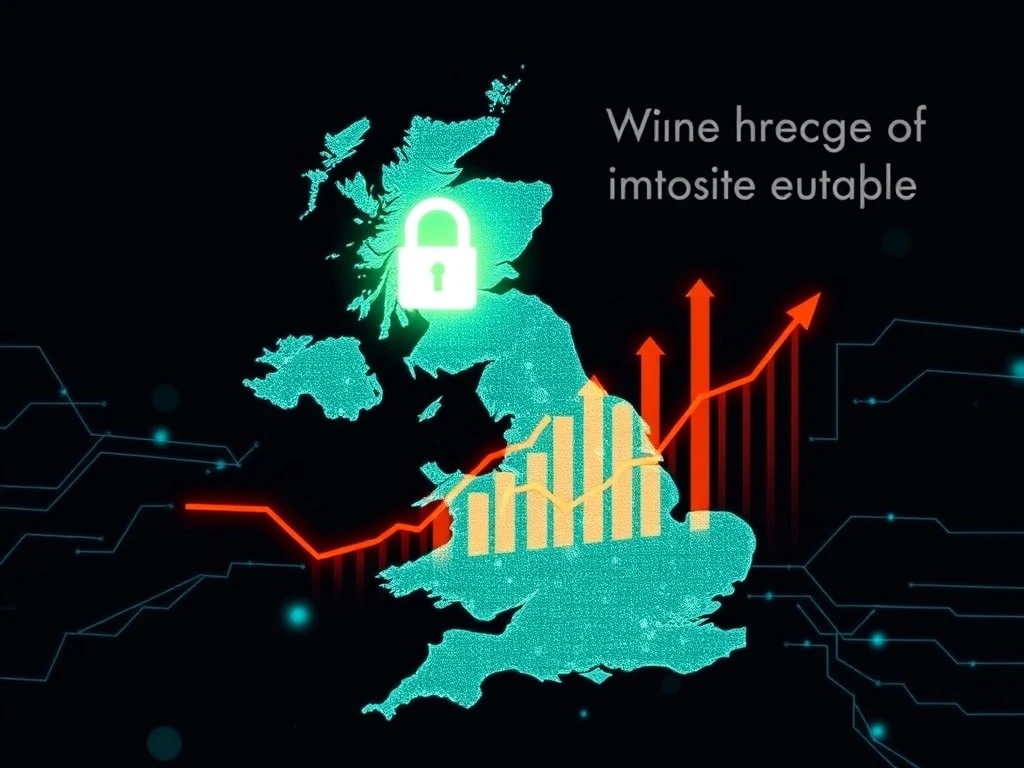ProtonVPN’s Explosive 1,400% Surge: UK’s Online Safety Act Ignites Digital Freedom Fight

In an era increasingly defined by digital control and data oversight, the pursuit of autonomy online resonates deeply with individuals who value decentralized systems and personal freedom – a sentiment often shared within the cryptocurrency community. The recent monumental surge in ProtonVPN sign-ups in the UK serves as a powerful testament to this global yearning for digital independence, directly challenging new government mandates. What does this dramatic shift mean for the future of online privacy?
The Spark: UK’s Online Safety Act Takes Effect
The United Kingdom recently witnessed an unprecedented public reaction to new digital regulations. The catalyst? The enforcement of the UK Online Safety Act. Enacted in 2023 under the Conservative government, this legislation mandates that platforms hosting adult content, including major social media sites like X, TikTok, and Reddit, implement robust age verification or “age assurance” systems for their UK users. The goal, as stated by the government, is to shield children under 18 from exposure to harmful material, including pornography and self-harm content.
Enforced by the regulator Ofcom, these rules require users to confirm their age through various methods, such as facial recognition, government ID checks, or bank-verified services. Non-compliant platforms face severe penalties, including fines of up to £18 million or 10% of their global revenue, whichever is greater. While the intention is to create a safer online environment for minors, the implementation has ignited a fierce debate about personal liberty and the practicality of such broad digital identification measures.
ProtonVPN Leads a Massive VPN Surge
The public’s response to the Online Safety Act was immediate and unequivocal. Immediately after the law took effect in mid-July 2025, ProtonVPN, developed by Swiss-based Proton AG, reported an astonishing 1,400% increase in UK user sign-ups. This surge was so significant that ProtonVPN surpassed even ChatGPT to become the most downloaded free app on Apple’s UK App Store. The phenomenon wasn’t isolated; competitors like Nord Security and Super Unlimited also climbed into the top ten, reflecting a broader shift in user behavior as individuals sought methods to bypass the new restrictions. This dramatic VPN surge underscores a growing resistance to the government’s digital identification measures, described by Proton as akin to spikes seen during major civil unrest.
Understanding the Controversy: Age Verification and Digital Privacy
While the UK Online Safety Act aims to protect children, critics argue it imposes undue burdens on users and risks infringing on fundamental digital privacy rights. The mandatory age verification methods, whether through facial recognition or ID uploads, raise significant concerns about data security and the potential for surveillance. Many fear that such extensive data collection could create vast databases of personal information, vulnerable to breaches or misuse.
The backlash has been swift and widespread. Within days of the law’s enforcement, over 290,000 people signed a parliamentary petition demanding its repeal, triggering a mandatory debate in the House of Commons. Privacy advocates and cybersecurity experts quickly pointed out the apparent flaw in the legislation: the ease with which these rules can be circumvented using VPNs. Virtual Private Networks mask users’ IP addresses and location data, making it simple to appear as if one is browsing from a different country, thus bypassing regional restrictions.
Anthony Rose, a UK entrepreneur and former BBC iPlayer architect, sharply criticized the legislation as “technologically illiterate,” highlighting that “installing a VPN takes less than five minutes.” This ease of circumvention raises questions about the long-term effectiveness of the Act and whether its intrusive measures truly achieve their intended goal, or merely push users towards less regulated digital spaces.
Global Echoes: A Pattern of Resistance
The UK’s experience is not an isolated incident; it mirrors similar surges in VPN adoption seen globally when internet restrictions tighten. This trend suggests a recurring pattern of user resistance to perceived digital overreach:
- France (June 2024): A 1,000% increase in VPN sign-ups followed the introduction of comparable age verification rules for adult content.
- Turkey: A significant 1,100% spike occurred after the government tightened internet restrictions, demonstrating a public desire to maintain access and anonymity.
- United States (Earlier this year): ProtonVPN also saw a 300% surge in sign-ups during a temporary TikTok outage, illustrating how users quickly turn to VPNs to maintain connectivity and access during disruptions or restrictions.
These global examples underscore a universal desire among internet users to retain control over their online experience and access information freely, even in the face of increasingly stringent regulatory environments.
The Unintended Consequences: Balancing Safety and Freedom
While governments worldwide grapple with the challenge of creating safer online spaces, particularly for minors, the case of the UK Online Safety Act highlights the complex tightrope walk between protection and personal freedom. Analysts caution that the UK’s current approach may struggle to balance its noble goals with user autonomy, especially as bypass methods like VPNs remain readily accessible and increasingly popular. The government insists that enforcement is non-negotiable, even as it pursues a digital trade agreement with the U.S., which has its own concerns about free speech and digital sovereignty.
The law’s long-term effectiveness will undoubtedly hinge on its adaptability to evolving circumvention tools. Critics warn that the proliferation of unregulated tools to evade oversight could create unintended risks, potentially pushing online activities further into the shadows. Conversely, proponents argue that the law’s benefits for protecting minors outweigh these challenges, emphasizing the importance of a safer digital environment for the youngest users.
Conclusion: A Clear Indicator of Digital Autonomy
The extraordinary 1,400% spike in ProtonVPN sign-ups in the UK stands as a clear and compelling indicator of public sentiment. It demonstrates that users in an open society are increasingly willing to adopt technological solutions to maintain their digital privacy and autonomy, even when faced with stringent regulatory efforts. This pushback is not just about accessing content; it’s about the fundamental right to navigate the internet without constant surveillance or mandated identification. As governments worldwide continue to explore ways to regulate the digital realm, the lessons from the UK’s age verification saga will undoubtedly shape future policy debates, underscoring the enduring power of individual choice in the digital age.
Frequently Asked Questions (FAQs)
1. What is the UK Online Safety Act?
The UK Online Safety Act is a law enacted in 2023 that mandates platforms hosting adult content to implement age verification systems for UK users. Its primary goal is to protect children under 18 from harmful online material.
2. Why did ProtonVPN sign-ups surge in the UK?
ProtonVPN sign-ups surged by 1,400% immediately after the UK Online Safety Act’s age verification rules took effect in mid-July 2025. Users sought VPNs to bypass the new restrictions and maintain their digital privacy and access to content without mandatory age checks.
3. How do VPNs help bypass age verification?
VPNs (Virtual Private Networks) work by masking a user’s true IP address and routing their internet traffic through servers in other countries. This makes it appear as if the user is browsing from a different location, allowing them to circumvent geo-restrictions and age verification systems tied to specific regions.
4. What are the main criticisms of the UK Online Safety Act?
Critics argue that the Act infringes on users’ digital privacy rights due to mandatory age verification, creates an undue burden on users, and is technologically illiterate because its rules can be easily bypassed with VPNs. There are also concerns about potential mass data collection and its implications for surveillance.
5. Are similar trends of VPN surges seen globally?
Yes, the UK’s experience mirrors similar trends in other countries. For instance, France saw a 1,000% increase in VPN sign-ups after introducing comparable rules, and Turkey experienced a 1,100% spike following tightened internet restrictions. These instances indicate a global pattern of users turning to VPNs in response to increased online regulation or censorship.
6. What does the ProtonVPN surge signify for digital privacy?
The ProtonVPN surge signifies a strong public sentiment for digital autonomy and privacy. It demonstrates that internet users are increasingly proactive in adopting technology to resist government-mandated digital identification and maintain control over their online activities, highlighting the ongoing tension between regulation and individual freedom in the digital realm.









